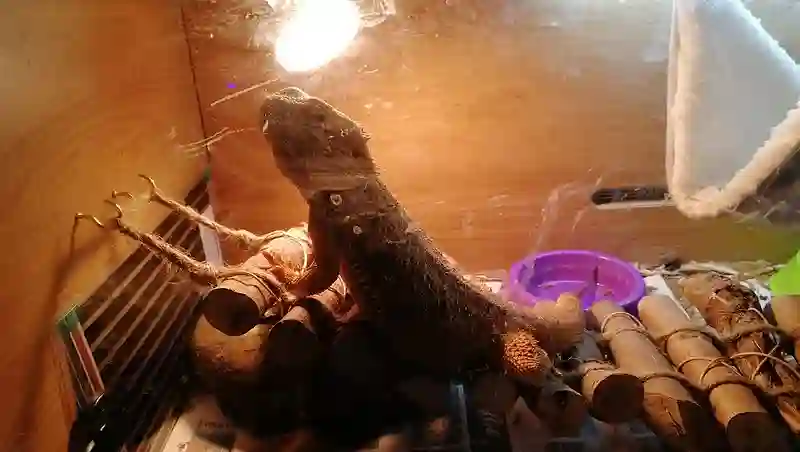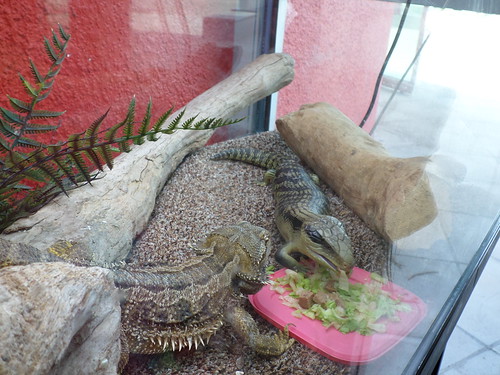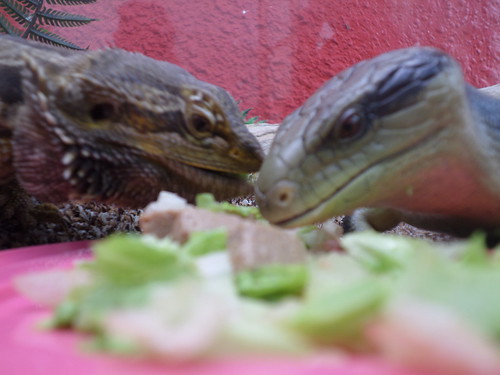Bearded dragons require calcium for their health and well-being. Here are some ways to give them calcium:
- Feed them calcium-rich foods: Leafy greens are a great source of calcium for bearded dragons. Some examples include cactus pads, collard greens, dandelion leaves, endive or escarole, mustard greens, turnip greens, kale, and rosemary.
- Use calcium powder: Calcium powder can be sprinkled on salads or fruit. Just put the fruit and veggies in a shallow container, sprinkle them with powder, and let the bearded dragon eat them.
- Provide bone meal: Bone meal tablets or powder can be given to bearded dragons to provide calcium.
- Dust their food: Bearded dragons typically receive much of the phosphorus they need through their diet, but not enough calcium. Dusting their food several times a week with calcium powder can ensure proper nutritional needs are met.
- Feed them live foods with calcium supplements: Some live foods, such as crickets, can be dusted with calcium powder before feeding to the bearded dragon.
Sources of Calcium
Calcium is an essential mineral for the health of bearded dragons. It is responsible for bone growth, muscle function, and nerve transmission.
Although bearded dragons can obtain calcium from their diet, they may require extra calcium in their food or water to prevent deficiency. There are two main sources of calcium for bearded dragons: natural sources in their diet and calcium supplements.
Natural sources in diet
Bearded dragons can obtain calcium from a variety of foods. However, not all foods are created equal when it comes to calcium content. Some examples of foods high in calcium include collard greens, mustard greens, kale, dandelion greens, turnip greens, beet greens and bok choy.
List of foods high in calcium for bearded dragons
In addition to the aforementioned vegetables above that are rich in vitamin A and K as well as some iron; other commonly available items that are also rich in Calcium include beetroot , carrots , mustard leaves , bottle gourd , squash or pumpkin flowers and fruits like Figs.
Importance of variety in diet
It’s important to note that while some food items may contain high amounts of Calcium others have low levels or may even inhibit the absorption process which makes it necessary to maintain a varied & balanced diet overall by feeding them a mixture of different items containing varying nutrient profiles.
Calcium supplements
If you want your pet’s health to be perfect then adding the right amount & type of supplement could work wonders such as providing Calcium via Supplements like “Rep-Cal Herptivite Multivitamin” which is specially formulated with Vitamins as well as Minerals geared towards supporting better bone growth.
Types available
Calcium supplements come in different forms such as powders, liquid drops or tablets. Some brands may even combine calcium with other vitamins and minerals for easy administration whilst also helping to provide them all of the nutrition they need in one go.
Dosage recommendations
The appropriate dosage of calcium supplement for your bearded dragon depends on its age, size, and health condition. It’s always best to consult a veterinarian before incorporating any new supplements into their diet who can advise you on the correct quantity needed based on their individual requirements.
Administering Calcium Supplements
Dusting food with calcium powder
One of the most common ways to give bearded dragons calcium supplements is by dusting their food. This involves coating their food with a powdered supplement that contains calcium.
The best way to do this is by using a small plastic bag or container and adding the supplement powder. Then, place the insects or vegetables in the bag or container and shake them until they are evenly coated.
It is important to note that not all foods need to be dusted with calcium powder every day. Insects should be dusted once every two feedings, while vegetables can be dusted once a week.
Step-by-step instructions on how to dust food with calcium powder
- Place the insects or vegetables in a plastic bag or container.
- Add the appropriate amount of supplement powder.
- Close the bag or container and shake until evenly coated.
- Feed your bearded dragon as usual.
Liquid supplements
Liquid supplements are another option for giving your bearded dragon extra calcium. These can come in different forms such as drops, syrups, or sprays. When choosing a liquid supplement, it is important to read the label carefully and follow dosage recommendations.
How to administer liquid supplements
The easiest way to administer liquid supplements is by adding them directly into your bearded dragon’s water dish. However, some dragons may not drink enough water for this method to work effectively. In this case, you can try mixing the supplement into their food instead.
It’s important not to exceed recommended dosages when using liquid supplements. Over-supplementing with liquids can lead to serious health problems for your pet dragon.
Signs and Symptoms of Calcium Deficiency
Bearded dragons require calcium for proper bone development, muscle function, and overall good health. A calcium deficiency can cause a variety of health problems in bearded dragons, including metabolic bone disease.
It’s important to recognize the signs of calcium deficiency so that you can take action to correct it before it leads to serious health issues. One common sign of a calcium deficiency is lethargy or weakness.
Bearded dragons may seem sluggish or uninterested in their environment if they aren’t getting enough calcium. Additionally, they may have trouble moving around properly due to weakened muscles.
Another common symptom is tremors or twitching in the limbs or tail. This can be a sign that your bearded dragon’s muscles are not functioning properly due to a lack of calcium.
Bearded dragons with a calcium deficiency may also have trouble shedding their skin properly. They may experience retained shed on toes or other parts of the body that can lead to infections.
What to do if you suspect your bearded dragon is deficient in calcium
If you suspect that your bearded dragon is deficient in calcium, it’s important to take action immediately. Without proper treatment, the condition can progress quickly and lead to serious health problems. The first step is to ensure that your bearded dragon is receiving adequate sources of dietary calcium through its food and supplements as outlined earlier in this article.
If you suspect there may still be an issue with their diet, consider speaking with a veterinarian familiar with reptiles for guidance on how best to adjust their food intake. In addition, it’s recommended that you expose your beardie to natural sunlight regularly (or provide UVB lighting) as one way for them to absorb vitamin D3 which helps absorb the dietary Calcium provided through food/supplements
If your bearded dragon has severe symptoms such as muscle tremors or difficulty walking, it’s important to seek veterinary care immediately. In some cases, your vet may recommend calcium injections or other treatments to help correct the deficiency quickly.
Recognizing the signs and symptoms of a calcium deficiency in bearded dragons is important for maintaining their overall health and well-being. By taking appropriate action and providing a proper diet plus supplements (and natural light) you can ensure that your bearded dragon gets the calcium it needs to stay healthy and happy.
Conclusion
Providing your bearded dragon with sufficient calcium is crucial to their overall health and well-being. A lack of calcium in their diet can lead to serious health problems such as metabolic bone disease, which can be painful and potentially fatal.
To ensure that your bearded dragon gets enough calcium, it is important to provide them with a balanced diet that includes a variety of foods high in calcium such as leafy greens, vegetables, and insects.
Administering calcium supplements such as dusting food with calcium powder or using liquid supplements can help meet their daily requirements. Keep an eye out for signs and symptoms of calcium deficiency such as lethargy or difficulty moving, tremors or twitches in limbs, and swelling or deformities in the limbs or spine.
If you suspect that your bearded dragon may be deficient in calcium, it is important to seek veterinary care immediately. By following the guidelines outlined in this article and regularly monitoring your bearded dragon’s health, you can ensure that they receive the necessary amount of calcium to thrive and live a happy life.



Leave a Reply